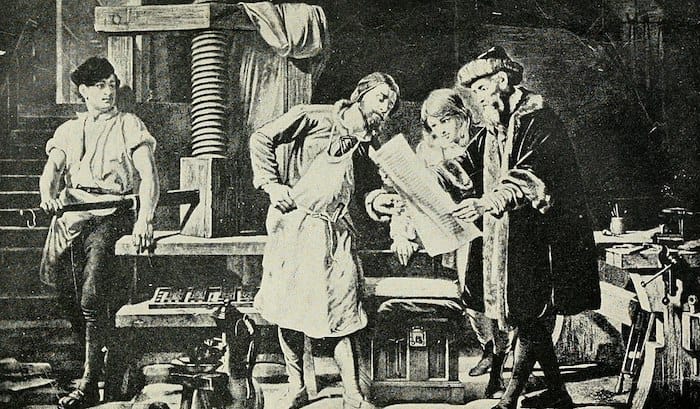Future magic circle trainee Will Holmes looks at the legal profession’s somewhat rocky record with technology

In the latest instalment of a mini-series that provides a historical perspective to the legal quandaries of the present, future magic circle trainee Will Holmes takes a look at how lawyers have responded to technological innovations and questions whether the industry is ready for legal tech disruption.
For the German monk Johannes Trithemius, a world without scribes “would see faith weakened, love grown cold, hope confounded, justice lost, the law confused and the Gospel fallen into oblivion”.
The arguments against the printing press put forward in Trithemius’ 1492 work In Praise of Scribes were frequently voiced by lawyers in the fifteenth and sixteenth centuries. At that point, it certainly didn’t look like the technological innovation of printing was going to have any immediate impact on the legal sector. Judges claimed “the [printed] books are against the law” and focused their criticisms on the system’s technical imperfections, complaining that misprints “many times confound the students!”.
Today, there is a similar sense of pessimism surrounding legal tech. The stories of the “revolutionary law firm” Clearspire and Silicon Valley-backed Atrium have demonstrated that it takes more than millions and big tech personalities to disrupt the legal sector. But whilst the lasting impact of modern technology on the legal sector still remains to be seen (and historical attempts to figure out why it happened are even further away), we do have the experience of the printing press, the invention that is perhaps yet to be dethroned from its title of being the most significant innovation in legal history.
Despite Trithemius’ claims, in the seventeenth century printing did eventually displace the slower and less accurate manuscript culture in the legal profession. Judges, who had earlier criticised it so fervently, later acknowledged that the innovation was now “the true and most sure register of the foundations and principles of our law”. But why did it take nearly 150 years since Caxton first brought over the first printing press to Westminster for print to become prevalent in English legal culture?
The slow proliferation of print can be attributed to a number of factors. First, the predominantly oral legal education established by the Inns of Court meant that it took some time for lawyers to fully realise the benefits of print. Second, the legal profession’s use of the French language, that was rare outside this context, meant that French legal texts had a limited audience and were less lucrative for entrepreneurial printers. As written education and English became more established in the legal profession, the scene was set for print to make its mark.
There was just one problem: the lawyers themselves. At the time, a lawyer’s value was his knowledge of the law rather than its application. As the sixteenth-century printer-lawyer John Rastell remarked, the law was “kept so secretly” that it functioned as “a trap and a net to bring the people to vexation and trouble”. Manuscript culture had served lawyers well in this regard. The Inns of Court exclusively controlled the circulation of manuscripts, centralising legal knowledge amongst a few practitioners who profited from its scarcity. It is only thanks to profit-seeking legal clerks, who spotted the opportunity to surreptitiously sell legal manuscripts to printers, that printing was able to escape from the lawyers’ stranglehold.
The steady leak of legal information reshaped the legal industry, democratising legal knowledge for the first time. This ultimately redefined the role of the lawyer, recentring the profession on interpreting the law for individuals who now had a better sense of their legal standing. This is particularly true for commercial law. Indeed, evidence suggests that areas of England with sizeable mercantile communities, rather than locations populated with lawyers, were the biggest buyers of legal texts.
An interesting reflection on the printing press comes from the lawyer-turned-priest John Donne. From his time in Lincoln’s Inn between 1616 and 1621, he came to this insightful conclusion: “it is an unjust thing in Controversies and Disputations, to press arguments out of Manuscripts, that cannot be seen by every man”. In other words, the common law had to be commonly accessible. Donne lamented that ideas about the importance of accessibility, which dated back to Thomist arguments made to lawyers perplexed by the growth of legal precedent in the twelfth century, had been neglected for centuries.
Just as the legal profession failed to pragmatically debate the effects of the printing press on justice, today, law’s traditions are deterring people from bringing cases. The Competition and Markets Authority’s (CMA) 2016 report revealed that around 70% of potential legal needs are unmet in the UK. Amongst the underlying reasons for this are concerns about “high and uncertain costs”. The uncertain price problem stems from the traditional billable hour system that is used by the majority of legal service providers. The longer a case lasts, the greater a lawyers’ earnings. This ironically, as the former magic circle lawyer Jim Diamond points out, incentivises the very inefficiencies that are damaging access to justice. Furthermore, the perceived “complexity and associated fear” of bringing a case was also cited by the CMA as a key factor in the high rate of unmet legal needs. Again, this favours lawyers whose expertise allows them to profit off a non-user-friendly judicial process.
In light of this, it is perhaps unsurprising that there is much talk of a “lawyer killer”. Projects, such as Kleros, Jur and Aragon can now resolve large volumes of small claims disputes that have been caused by the advent of the internet. In the UK, more affordable chatbot lawyers, such as DoNotPay, LawBot and LISA, have marked an improvement in the accessibility of certain legal services. Robot judges in Estonia and China’s Internet Courts are other headline-grabbing responses. Still yet to be proven is the prospect of decentralised governance in law firms which could create purpose-driven law firms out of nowhere. Lawyers across the globe could pool their resources and fill gaps in legal work that are being missed by the market.
In law, the buck always stops with the client. If technology can change their relationship with the law and legal services, then legal tech — in whatever shape or form — has arrived.


